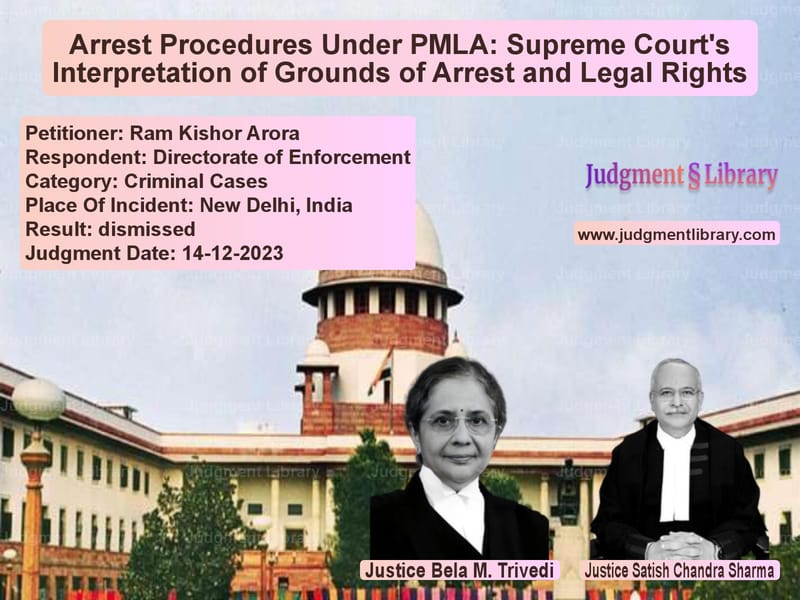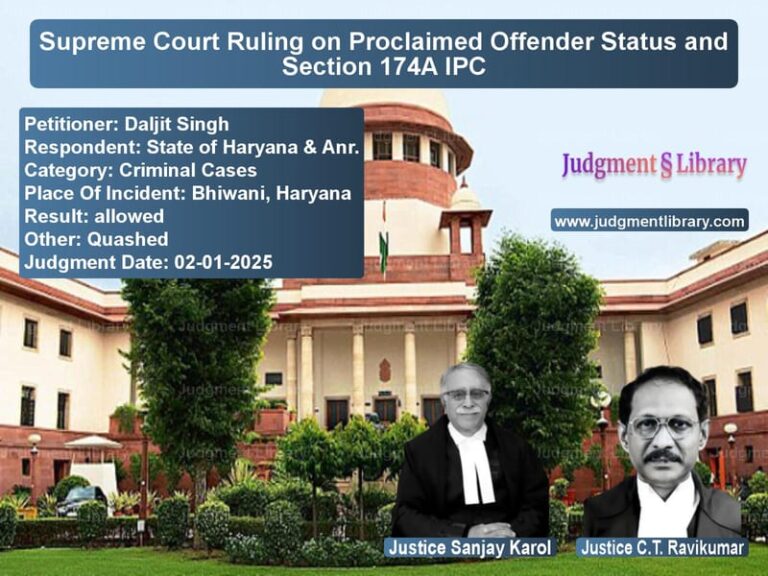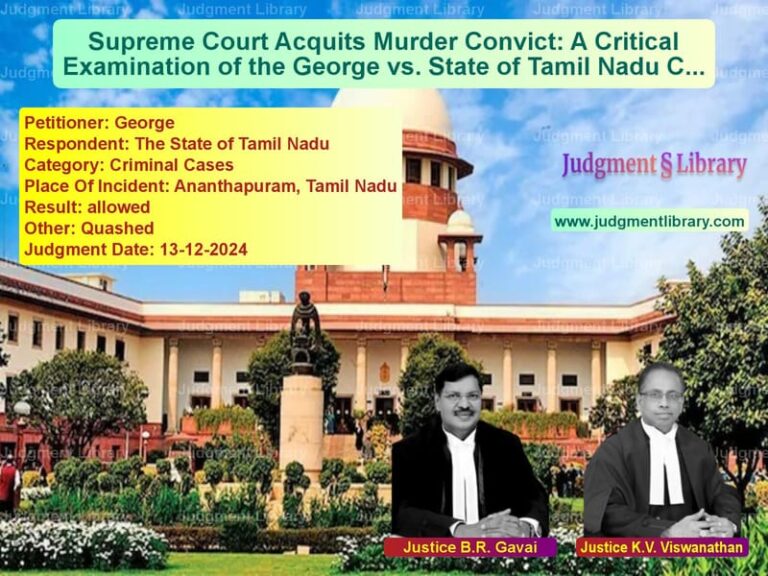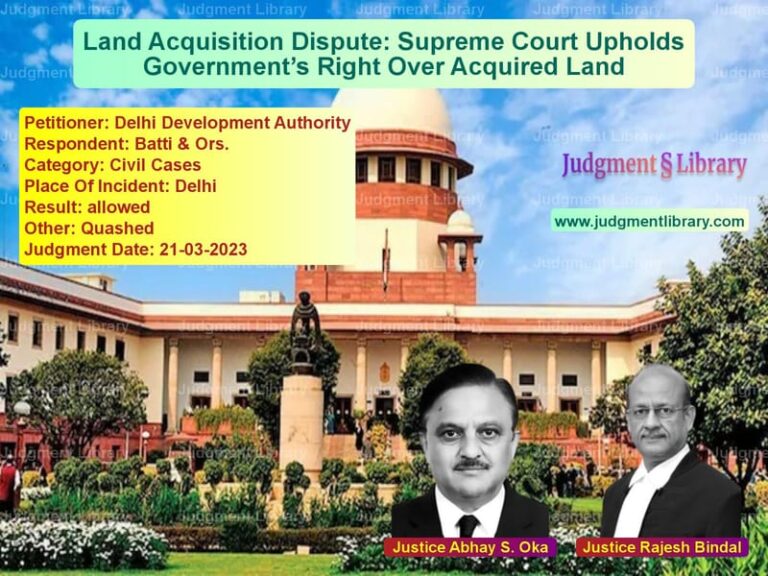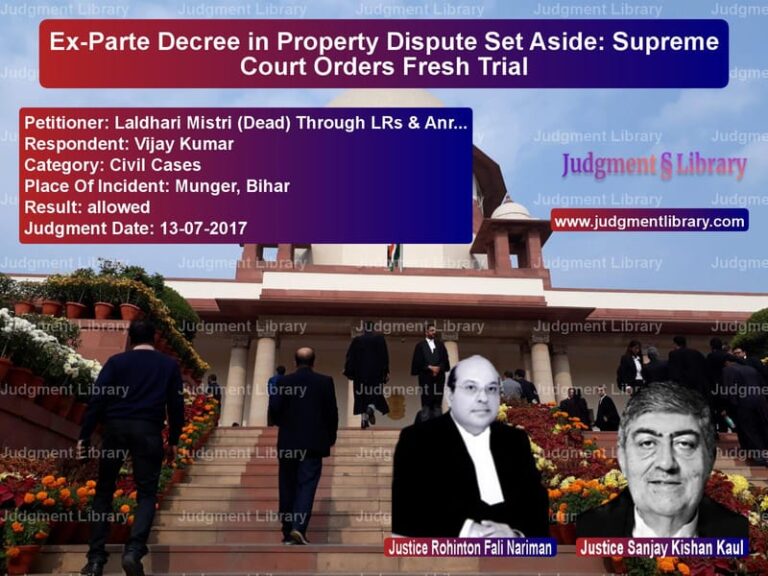Arrest Procedures Under PMLA: Supreme Court’s Interpretation of Grounds of Arrest and Legal Rights
The Supreme Court of India recently addressed critical questions surrounding the Prevention of Money Laundering Act (PMLA), specifically focusing on the arrest procedure under Section 19 of the Act. The case, involving Ram Kishor Arora and the Directorate of Enforcement (ED), examined whether the ED’s failure to furnish a written copy of the grounds of arrest at the time of the appellant’s arrest violated the provisions of PMLA and the Constitution of India.
The case brought to light the nuances of legal protections afforded to individuals under Article 22(1) of the Constitution, which guarantees the right to be informed of the reasons for one’s arrest. The petitioner’s appeal questioned the legality of the arrest based on non-compliance with these requirements, raising significant concerns about the procedural safeguards in place for individuals arrested under the PMLA.
Petitioner’s Arguments
The appellant, Ram Kishor Arora, contended that his arrest by the ED on June 27, 2023, was unlawful because the ED did not immediately provide him with a written copy of the grounds for his arrest. The specific arguments made by the petitioner were:
- The ED failed to provide a written copy of the grounds of arrest at the time of the appellant’s arrest, violating Section 19(1) of the PMLA and Article 22(1) of the Constitution, which requires that the grounds for arrest be provided immediately.
- The mere act of having the grounds of arrest read to him and obtaining his signature was insufficient, as the law mandates that the grounds be furnished in writing.
- The failure to provide a written copy of the grounds of arrest constitutes a serious violation of his constitutional rights, rendering the arrest illegal.
- The ED’s actions were inconsistent with the guidelines set by the Court in previous judgments, particularly in the Pankaj Bansal case, which emphasized the need to furnish a written copy of the grounds of arrest immediately.
Respondent’s Arguments
The respondent, Directorate of Enforcement, countered the appellant’s claims by asserting that the arrest was carried out in full compliance with the provisions of the PMLA. The ED argued:
- Section 19 of the PMLA requires that the arrestee be informed of the grounds of arrest as soon as possible, which was done in this case.
- The grounds for arrest were provided to the appellant, who read them and signed the document acknowledging that he had been informed. This satisfied the requirements of Section 19(1) of the PMLA.
- The appellant’s signature on the document and his endorsement confirming that he had read the grounds of arrest demonstrate compliance with the legal requirements.
- The failure to immediately provide a copy of the grounds of arrest does not make the arrest illegal, as the law allows for the provision of the grounds to be done as soon as reasonably possible, not necessarily at the exact moment of the arrest.
Supreme Court’s Ruling
The Supreme Court examined the case and the relevant legal provisions under the PMLA, as well as the appellant’s constitutional rights under Article 22(1). After considering the arguments, the Court ruled:
- The Court affirmed that the ED’s actions were in compliance with the requirements of Section 19 of the PMLA. The grounds of arrest were indeed communicated to the appellant at the time of the arrest, and the appellant signed the document acknowledging the same.
- The requirement to inform the arrested individual of the grounds of arrest is intended to ensure transparency and safeguard individual rights. However, the Court ruled that this does not necessitate the immediate physical handover of the written document at the moment of arrest, as long as the arrested person is informed about the grounds.
- The Court emphasized that the failure to provide a written copy at the exact time of arrest does not automatically render the arrest illegal. Instead, the arrest is considered lawful if the grounds are communicated to the person promptly and in a manner that is understandable, which was done in this case.
- Referring to previous cases, such as Pankaj Bansal vs. Union of India, the Court acknowledged that there is a practice of not immediately providing a written copy of the grounds, but it clarified that this would not invalidate an arrest as long as the grounds were made known to the individual.
Conclusion
The Supreme Court’s ruling in this case clarifies the procedures regarding the communication of the grounds of arrest under the PMLA. While it reiterates the importance of informing the arrested person about the reasons for their arrest, the Court also allows for some flexibility in how this is done. The judgment emphasizes that as long as the individual is informed about the grounds for arrest in a timely manner, the failure to immediately provide a written copy does not invalidate the arrest. This decision provides clarity on the interpretation of Section 19 of the PMLA and reinforces the protections afforded to individuals under the Constitution, while balancing the needs of law enforcement.
Petitioner Name: Ram Kishor Arora.Respondent Name: Directorate of Enforcement.Judgment By: Justice Bela M. Trivedi, Justice Satish Chandra Sharma.Place Of Incident: New Delhi, India.Judgment Date: 14-12-2023.
Don’t miss out on the full details! Download the complete judgment in PDF format below and gain valuable insights instantly!
Download Judgment: ram-kishor-arora-vs-directorate-of-enfor-supreme-court-of-india-judgment-dated-14-12-2023.pdf
Directly Download Judgment: Directly download this Judgment
See all petitions in SC/ST Act Case
See all petitions in Money Laundering Cases
See all petitions in Bail and Anticipatory Bail
See all petitions in Other Cases
See all petitions in Judgment by Bela M. Trivedi
See all petitions in Judgment by Satish Chandra Sharma
See all petitions in dismissed
See all petitions in supreme court of India judgments December 2023
See all petitions in 2023 judgments
See all posts in Criminal Cases Category
See all allowed petitions in Criminal Cases Category
See all Dismissed petitions in Criminal Cases Category
See all partially allowed petitions in Criminal Cases Category

